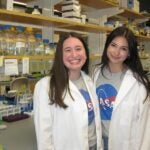Events
News
 The leopard seal in focus June 27, 2025 - While leopard seals might be easily recognized for their ominous portrayals as villains in movies, they largely remain a mystery to humans. Professor Sarah Kienle and postdoctoral researcher Emily Sperou are working to fix that by contributing to our scientific understanding of these marine apex predators.
The leopard seal in focus June 27, 2025 - While leopard seals might be easily recognized for their ominous portrayals as villains in movies, they largely remain a mystery to humans. Professor Sarah Kienle and postdoctoral researcher Emily Sperou are working to fix that by contributing to our scientific understanding of these marine apex predators. Applications of GIS: Meagan Shanaghan on the Development of URI Botanical Collections Database June 25, 2025 - At URI, GIS is used to manage the impressive botanical collections on the Kingston Campus. What started as a need for better organization of the accessions database – a spreadsheet that tracked the inventory of plants housed on campus – grew into an interactive tool used by both staff and visitors alike: URI Botanical Collections Database. The leading developer for the database was GIS and spatial services specialist Meagan Shanaghan ‘20 M.E.S.M. ‘23.
Applications of GIS: Meagan Shanaghan on the Development of URI Botanical Collections Database June 25, 2025 - At URI, GIS is used to manage the impressive botanical collections on the Kingston Campus. What started as a need for better organization of the accessions database – a spreadsheet that tracked the inventory of plants housed on campus – grew into an interactive tool used by both staff and visitors alike: URI Botanical Collections Database. The leading developer for the database was GIS and spatial services specialist Meagan Shanaghan ‘20 M.E.S.M. ‘23. Leave no trace: Careful social media sharing can help protect local reptiles and amphibians June 24, 2025 - Compared to other New England states, there is less turtle density in Rhode Island due to the state’s urbanization. However, careful driving, and media use, are still recommended to help protect turtles and other vulnerable reptile and amphibian species.
Leave no trace: Careful social media sharing can help protect local reptiles and amphibians June 24, 2025 - Compared to other New England states, there is less turtle density in Rhode Island due to the state’s urbanization. However, careful driving, and media use, are still recommended to help protect turtles and other vulnerable reptile and amphibian species. Taking curiosity to new heights: URI Ph.D. students awarded NASA fellowship June 24, 2025 -
Two Ph.D. students in the College of the Environment and Life Sciences’ interdisciplinary biological and environmental sciences graduate program have been awarded graduate research fellowships from the NASA Rhode Island Space Grant Consortium. Michelle Marder and Kate Remy ’24 are specializing in cell and molecular biology and aim to help scientists better understand antibiotic resistance.
Taking curiosity to new heights: URI Ph.D. students awarded NASA fellowship June 24, 2025 -
Two Ph.D. students in the College of the Environment and Life Sciences’ interdisciplinary biological and environmental sciences graduate program have been awarded graduate research fellowships from the NASA Rhode Island Space Grant Consortium. Michelle Marder and Kate Remy ’24 are specializing in cell and molecular biology and aim to help scientists better understand antibiotic resistance. Safe well water? Test to be sure June 18, 2025 - To provide residents with information on private well water testing, treatment, and maintenance, water quality expert Alyson McCann with the University of Rhode Island’s Cooperative Extension Water Quality Program will hold a free program on Wednesday, July 9, from 6 to 7 p.m. at the Cross’ Mills Public Library, 4417 Old Post Road, in Charlestown.
Safe well water? Test to be sure June 18, 2025 - To provide residents with information on private well water testing, treatment, and maintenance, water quality expert Alyson McCann with the University of Rhode Island’s Cooperative Extension Water Quality Program will hold a free program on Wednesday, July 9, from 6 to 7 p.m. at the Cross’ Mills Public Library, 4417 Old Post Road, in Charlestown.  URI Cooperative Extension program aims to rescue and recycle food by changing the way Rhode Islanders interact with it June 11, 2025 - Applications are now open for Food Recovery for Rhode Island at the University of Rhode Island, a community education program for Rhode Islanders offered through URI Cooperative Extension. The six-week course includes online coursework and field experiences that can be completed at participants’ convenience.
URI Cooperative Extension program aims to rescue and recycle food by changing the way Rhode Islanders interact with it June 11, 2025 - Applications are now open for Food Recovery for Rhode Island at the University of Rhode Island, a community education program for Rhode Islanders offered through URI Cooperative Extension. The six-week course includes online coursework and field experiences that can be completed at participants’ convenience. Riverkeeper Kate McPherson ’03 on Protecting the Narragansett Bay Watershed June 10, 2025 - As part of Save the Bay’s saltwater restoration work, Kate McPherson ’03 works to mitigate the problems and risks of the invase Phragmites australis.
Riverkeeper Kate McPherson ’03 on Protecting the Narragansett Bay Watershed June 10, 2025 - As part of Save the Bay’s saltwater restoration work, Kate McPherson ’03 works to mitigate the problems and risks of the invase Phragmites australis.  Fire hazard: Phragmites sometimes pose an overlooked risk June 4, 2025 - While fires can be caused for a variety of reasons, manmade and natural, invasive phragmites sometimes pose an overlooked risk. Laura Meyerson, professor of natural resources science, would like to see other New Englanders recognize the ubiquitous plant known as Phragmites australis growing by roadways and ponds for what it is.
Fire hazard: Phragmites sometimes pose an overlooked risk June 4, 2025 - While fires can be caused for a variety of reasons, manmade and natural, invasive phragmites sometimes pose an overlooked risk. Laura Meyerson, professor of natural resources science, would like to see other New Englanders recognize the ubiquitous plant known as Phragmites australis growing by roadways and ponds for what it is.
